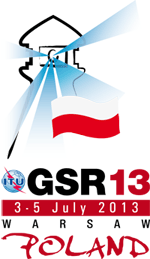Session II
Are standards the crux of ICT businesses in today's digital
world?
The session on
standards was
moderated by Mr
Antoine Dore,
Senior Legal
Officer, ITU
Legal Affairs
Unit. Mr Dore
presented the
panellists: Ms
Renata Hesse,
Deputy Assistant
Attorney General
for Criminal and
Civil
Operations,
United States
Department of
Justice,
Antitrust
Division; Ms
Marieke Scholz,
Senior Case
Handler, EC
Directorate
General
Competition; and
Dr Suthiphon
Thaveechaiyagarn,
Commissioner,
National
Broadcasting and
Telecommunications
Commission
(NBTC),
Thailand.
The discussion
paper on the
role of
standards in a
digital economy
was presented by
Dr Rudi Bekkers,
Assistant
Professor,
Eindhoven
University of
Technology,
Netherlands.
The panel shared
the view that
standardization
and the patent
system can serve
as effective
mechanisms to
promote
innovation and
boost the
economy. In a
digital world,
standards are
being recognized
as pivotal for
economic and
social growth.
From a user
perspective,
there are both
advantages and
disadvantages
associated with
standards. On
the positive
side, standards
encourage
technical
change,
innovation and
competition, as
well as
facilitate
international
trade. At the
same time,
standards can
transfer power
and hamper
competition. The
positive
effects,
however, seem to
outweigh the
negative ones.
The presenter
outlined the
current trends
and kicked off
the debate on
the key
challenges for
all the
different kinds
of stakeholders.
Recently, there
has been a
growing demand
for standards in
the ICT sector.
Because ICT
markets are
extremely
dynamic, patents
are increasingly
being traded and
this creates an
underlying
complexity. The
number of
patents is on
the rise,
notably in the
area of
technical
compatibility.
For example, the
standard H.284
which serves to
transfer video
files via PC
incorporates
more than 1300
patents.
Globally, one
patent out of
six is a telecom
one. This is not
surprising given
that there are
some 500
standards in a
laptop.
Litigation on
standards
matters is
growing in
importance and
costs the
industry a lot
of money.
Tensions
relating to
essential
patents have
recently become
apparent. The
actual or
prospective
implementer of
any given
standard is
bound to use the
technology
covered by
essential
patents, and
seek a licence.
This gives the
patent owner an
exclusive power,
which may lead
to competitive
and other
concerns.
Speakers
emphasized,
however, that
these concerns
need to be
balanced against
the benefits of
patents and
standards,
including the
long-term
incentives for
parties to
invest in
research and
development
activities.
Lawsuits between
Nokia and Apple,
between Apple
and Samsung, and
between Motorola
(later Google)
and Microsoft
are the most
well-known
examples of
complex
litigation cases
yet to be
resolved.
In the framework
of patents and
standards,
national ICT
regulators have
a key role to
play. With the
growing evidence
of the
importance of
standards for
the economy and
society, and the
potential
detrimental
effects of
problems with
patents,
policy-makers
and regulators
are increasingly
expected to be
proactive in
protecting
consumer
interests along
with those of
industry
players. Some
other entities,
such as courts
and competition
authorities,
also need to get
involved in
finding
solutions to
implementation
issues and
disputes. All
stakeholders
need to work
together, as no
stakeholder, be
it a
standards-setting
body, patent
office or other,
can address them
alone.
Collaboration
and information
sharing are thus
essential, at
national as well
as at
international
level, to
continue to spur
innovation and
growth in the
ICT sector.
|
|






